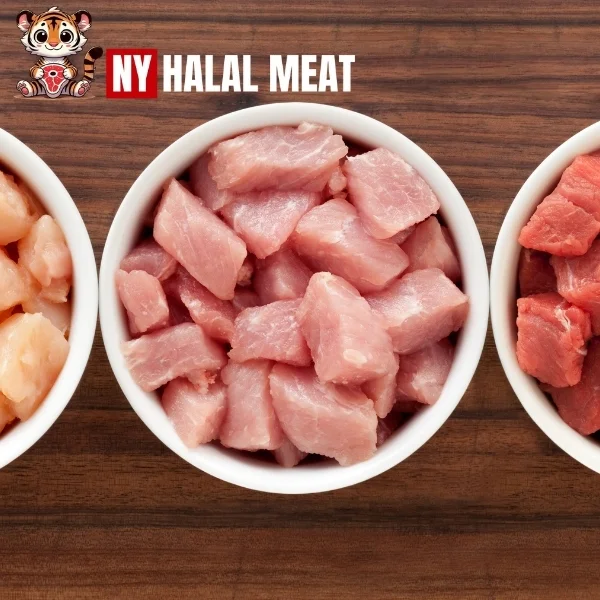What makes halal meat different from organic meat?
What Makes Halal Meat Different from Organic Meat?
Halal meat and organic meat are often seen as high-quality options by conscious consumers, but they are driven by distinct principles. While both types of meat focus on the ethical treatment of animals and avoid harmful additives, they differ in terms of the specific standards they adhere to and the processes involved.
This article will explore the main differences between halal and organic meat, examining everything from slaughter methods to certification, and what sets each option apart.
What is Halal Meat?
Halal meat refers to meat that adheres to Islamic dietary laws. The term “halal” means “permissible” in Arabic, and halal meat must meet certain criteria in terms of how the animal is raised and slaughtered.
Halal Slaughtering Process:
- Ritual Slaughtering: Halal meat comes from animals slaughtered according to Islamic guidelines. This includes invoking the name of God (Allah) before the slaughter and making a swift cut to the throat, windpipe, and blood vessels, ensuring a humane and quick death.
- Blood Draining: One key requirement of halal slaughter is the complete draining of blood from the animal, which is believed to ensure cleanliness and hygiene.
- Animal Welfare: Halal guidelines also focus on humane treatment of animals, ensuring they are treated well before slaughter.
What is Organic Meat?
Organic meat, in contrast, refers to meat from animals raised according to organic farming practices. Organic meat is certified based on its production process, which focuses on sustainability, ethical treatment, and avoiding synthetic chemicals.
Key Aspects of Organic Meat:
- No Synthetic Additives: Organic meat must come from animals that have not been treated with synthetic hormones, antibiotics, or genetically modified feed. This ensures the meat remains free from artificial substances.
- Free-Range and Grass-Fed: Organic certification requires animals to have access to the outdoors, and many organic farms use grass-fed methods to raise their livestock, ensuring the animals are fed naturally.
- Environmental Responsibility: Organic farming practices also prioritize sustainability, aiming to reduce environmental impact through practices like crop rotation, biodiversity, and reduced pesticide use.
Key Differences Between Halal and Organic Meat
While both halal and organic meat aim to ensure high standards of animal welfare and natural processes, there are notable differences:
Slaughter Method:
- Halal Meat: The most significant difference between halal and organic meat is the slaughtering method. Halal meat must be slaughtered according to Islamic principles, which includes a prayer before slaughter and specific cuts to the animal.
- Organic Meat: Organic certification does not require any specific slaughter method. While it ensures that the animal was raised in a humane manner, it does not require that the slaughter be performed according to religious practices.
Certification Process:
- Halal Meat: Halal meat must be certified by an accredited halal certification body, which ensures it has been slaughtered and handled according to Islamic laws. This certification verifies that the meat meets religious standards.
- Organic Meat: Organic meat must be certified by a recognized organic certification body, such as the USDA. Organic certification focuses on the farming methods, ensuring the meat is produced without synthetic chemicals or antibiotics.
Animal Welfare:
- Halal Meat: Halal guidelines emphasize humane treatment during the life of the animal, though halal certification does not automatically require free-range practices.
- Organic Meat: Organic standards typically require free-range conditions and allow animals access to outdoor spaces. Organic farming practices are focused on maintaining high welfare standards.
Health Considerations: Halal vs Organic Meat
Both halal and organic meats are considered healthy options, but their health benefits differ slightly.
Halal Meat:
- Cleanliness: The practice of draining blood from the animal is believed to make halal meat cleaner and free from bacteria that can be found in blood.
- Antibiotic Use: While halal meat does not necessarily need to be free from antibiotics, many halal producers choose to follow organic standards, avoiding the use of antibiotics and growth hormones.
Organic Meat:
- No Chemical Residues: Organic meat is guaranteed to be free from synthetic chemicals, antibiotics, and growth hormones. This can be an important factor for consumers concerned about the potential health risks of chemicals in meat.
- Nutritional Value: Some studies suggest that organic meat may contain higher levels of omega-3 fatty acids and other beneficial nutrients due to the animals’ diet.
Which Is Better: Halal or Organic Meat?

The choice between halal and organic meat depends on individual needs, values, and preferences.
- For Muslims: Halal meat is a religious requirement, and consuming halal ensures adherence to Islamic dietary laws.
- For Ethical or Health Concerns: Organic meat might be more appealing for those focused on avoiding synthetic chemicals or those who prefer sustainably raised animals.
- For Both Ethical and Health Considerations: Some consumers may opt for both halal and organic meat to meet their ethical, health, and religious standards.
Conclusion
Halal and organic meats both emphasize high standards of animal welfare and sustainability, but they are defined by different principles. Halal meat follows Islamic dietary guidelines, focusing on the humane slaughtering of animals, while organic meat focuses on natural farming practices that prioritize sustainability and the avoidance of chemicals. Depending on your personal preferences and values, either option could be a healthy and ethical choice for your diet.
One comment
You must be logged in to post a comment.



[…] Organic Does Not Always Mean Halal […]